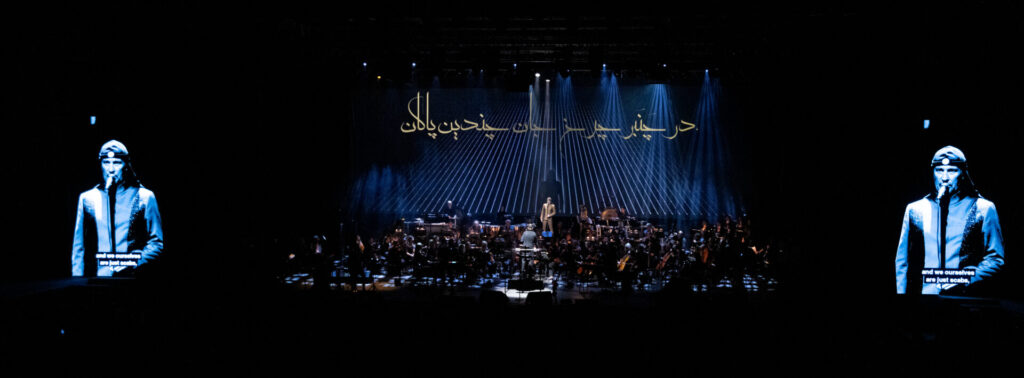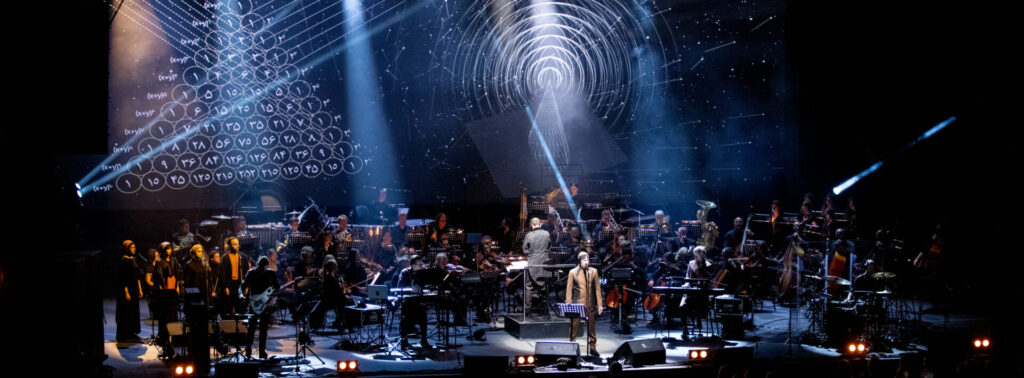Laibach announced Alamut to a roomful of music journalists in London back in July of 2022. The album they were aiming to bring to fruition was unusual even by their unorthodox standards. The Slovenians set forth a project on an epic scale: a nine movement symphonic work to be performed in both Ljubljana and Tehran with a full orchestra, written by Iranian composers Idin Samimi Mofakham and Nima A. Rowshan in collaboration with the Slovenian composer Luka Jamni of Laibach.
Alamut would be based on a Slovenian novel published in 1938. Vladimir Bartol’s book, set in eleventh century Persia, was sarcastically dedicated to Benito Mussolini by the author when it was first published. Named after the Alamut Fortress in the province of Qazvin in Iran where a community of Ismaili warriors or Hashshashin (order of assassins) were led by Hassan-i Sabbah, it’s a historical novel that alludes to the rise of fascism in Europe and invites us to draw parallels with the rise of neo-fascism in the present.
The project seemed like an audacious undertaking even when considered against the group’s long subversive history, particularly with regards to staging it in Tehran. Back in 2022, Ivan Novak – the group’s mouthpiece – spoke of the delicacy of diplomatic engagement with the Iranian culture ministry to get the piece performed in Iran. If it appeared to be a tall order in 2022, it’s surely out of the question in 2025 or any year soon, regardless of the fact Laibach were the first western band to officially play a full concert in North Korea.
The official reason for the deferment is apparently worsening relations between Iran and Slovenia (and by extension, the European Union), indirectly as a result of the war in Ukraine. One assumes tensions between Iran and Israel, a rogue ally of the west, hasn’t helped matters, while the murder of 22-year-old Kurdish Iranian girl Mahsa Amini by morality police in a Tehran jail – and the “Woman Life Freedom” uprising it inspired – must have played its part too. Even seasoned observers of the geostrategic chessboard like Laibach couldn’t have foreseen how swiftly and absurdly the political tectonic plates would shift. There’s no doubt a moral to this story regarding best laid plans and authoritarian theocracies, though the breaking down of logistics is all part of the game for Laibach. The conversation continues while their art, or its internment, becomes a microcosmic reflection of wider political machinations.

If the world in which Alamut arrives appears to be plumbing new depths, then it’s also a reminder that fanaticism is nothing new, whether now, during the 20th century or the 11th century. Great art in reaction to troubling events is nothing new in the Laibach canon either, though Alamut is almost certainly the most jaw-dropping work they’ve been involved in across a 45-year career and counting. The parodic Laibach and the arch Laibach are both eschewed for something more sincere, sober, solemn, expanding and pushing the boundaries of what they do. Indeed, the sonic flourishes and abstract digressions feel removed from the art pranksterism they’ve sometimes become associated with.
There are traces of the old Laibach however: ‘Fedayeen’, the first taster from the album, at least nods to the abrasive electronics and occultish folk horns of 1985’s Nova Akropola. ‘Vade Retro Satanas’, meanwhile, which was recorded around the same time as that album and made it onto the retrospective collection Rekapitulacija 1980–1984, took on a life of its own when it was performed live with the Slovenian Philharmonic Orchestra in 1997 as part of the European Month of Culture event in Ljubljana. The recording of that track was included with the extras of the recent reissue of Nova Akropola, and listened to retrospectively, it very much feels like the genesis of Alamut, an inceptionary moment and a dress rehearsal for something much bigger further down the line.
Alamut, for the record, was recorded at the Slovenian concert, which did go ahead. The event took place at the Križanke Outdoor Theatre in Ljubljana in September 2022, performed by the RTV Slovenia Symphony Orchestra and conducted by the Iranian Navid Gohari, with the Human-Voice Ensemble from Tehran in conjunction with the Gallina Vocal Group from Slovenia. Moreover, there was a 60-piece accordion orchestra on hand, if the stage wasn’t already full enough. Three years later, the recording finally gets its release. So away from the manoeuvring of geopolitical forces beyond Laibach’s control, how does the symphonic work work as a product in its own right?
Well is the answer. Whether or not an awareness of the text is more conducive to a better understanding of Laibach’s interpretation of it is open to conjecture, though tracks called ‘Doors of Perception’ and ‘Metaverse’ suggest bold liberties taken with the narrative anyway. The Slovenian novel wasn’t translated into English until 2004, though its progeny Assassin’s Creed and the creed itself – “nothing is true, everything is permitted” – is known to gamers more than music fans. Like Laibach’s previous album Wir Sind Das Volk, based upon the writings of Heiner Müller, the subject matter is a little recherché for monoglots but warrants investigation nonetheless as foundational texts that put the sedition into Laibach. The same perhaps can’t be said for Iron Sky, a 2012 action film about Nazis establishing ratlines to the Moon, though part of the beauty of Laibach is that all notions of high and low art are dissolved, and Iron Sky and its sequel Iron Sky II: The Coming Race at least star Udo Kier.

Alamut stands as a great work on its own terms, from the stealthy rolling timpanis of the ‘Overture’ to the insurrectionary ‘Meditation II & Epilogue’, featuring Milan Fras as Hasan-i Sabbah rasping: “I know neither cruelty nor mercy. I only implement my plan… terrible is the god who guides us…” In between, ‘Secret Gardens’ holds the most intrigue: an atmospheric piece with singing bowls, electronic noise and feedback, building stealthily as the Tehran Voice Ensemble sings in Arabic. There’s a similar stasis to ‘Metaverse’, where we find ourselves perhaps somewhere between heaven and earth, a psychedelic 17-minute dreamscape/nightmarescape where the noise sometimes recalls György Ligeti, sometimes Merzbow. It’s a dense field of sound to get lost in with a host of intermittent voices that wail and howl and ululate independently of each other, seemingly coming from all directions: begging, pleading, worshipping, calling out in confusion… and you may find yourself hoping there’ll be a spatial audio version to fully absorb yourself in one day.
This purgatory follows ‘War’, the moment everything leads up to and then slowly recovers from. That aforementioned 60-piece accordion orchestra provides the proverbial rattling of sabres, the hot air and the empty vessels, advocating for conflict. The awesome cacophony that follows feels like a rupture in the space time continuum. It’s Laibach taking their Martial Industrial aesthetic to its logical conclusion, a moment of almighty sonic disturbance that can only really be achieved when all the parts of a plan seemingly fall into place just as you happen to have several massive orchestras and choirs on hand. That happened in Ljubljana but can it happen again? To do it once more in Tehran would be a feat of ingenuity that will require übermenschen to pull it off. But as we’ve learnt, you should never underestimate Laibach.



